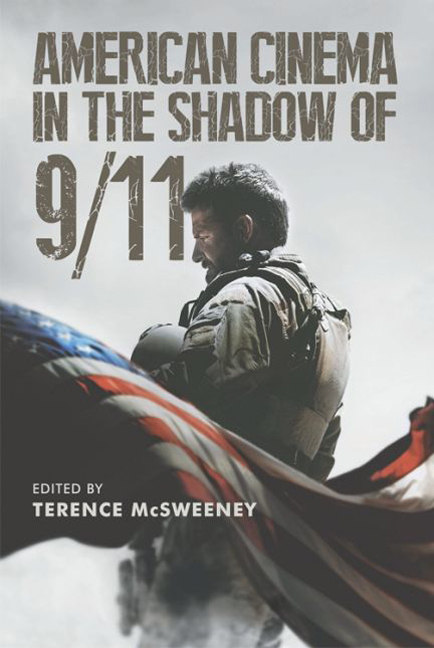Book contents
- Frontmatter
- Contents
- List of Figures
- Acknowledgements
- Foreword
- Introduction: American Cinema in the Shadow of 9/11
- Part I Dramatisations of the ‘War on Terror’
- Part II Influences of the ‘War on Terror’
- Part III Allegories of the ‘War on Terror’
- 11 ‘Daddy, I'm ScareD. Can We Go Home?’ Fear and Allegory in Frank Darabont's the Mist (2007)
- 12 The Terrible, Horrible Desire to Know: Post-9/11 Horror Remakes, Reboots, Sequels and Prequels
- 13 Post-9/11 Power and Responsibility in the Marvel Cinematic Universe
- 14 Nowhere Left to Zone in Children of Men (2006)
- 15 Traumatise, Repeat, Finish: Military Science Fiction (long) After 9/11 and Doug Liman's Edge of Tomorrow (2014)
- Selected Filmography
- Notes on the Contributors
- Index
13 - Post-9/11 Power and Responsibility in the Marvel Cinematic Universe
from Part III - Allegories of the ‘War on Terror’
Published online by Cambridge University Press: 10 May 2017
- Frontmatter
- Contents
- List of Figures
- Acknowledgements
- Foreword
- Introduction: American Cinema in the Shadow of 9/11
- Part I Dramatisations of the ‘War on Terror’
- Part II Influences of the ‘War on Terror’
- Part III Allegories of the ‘War on Terror’
- 11 ‘Daddy, I'm ScareD. Can We Go Home?’ Fear and Allegory in Frank Darabont's the Mist (2007)
- 12 The Terrible, Horrible Desire to Know: Post-9/11 Horror Remakes, Reboots, Sequels and Prequels
- 13 Post-9/11 Power and Responsibility in the Marvel Cinematic Universe
- 14 Nowhere Left to Zone in Children of Men (2006)
- 15 Traumatise, Repeat, Finish: Military Science Fiction (long) After 9/11 and Doug Liman's Edge of Tomorrow (2014)
- Selected Filmography
- Notes on the Contributors
- Index
Summary
IN THE BEGINNING … POWER AS ORIGIN STORY
’ It's about power. Who's got it. Who knows how to use it.’ These words begin the first episode of the 1997 to 2003 television series Buffy the Vampire Slayer 's final season, and that same episode's concluding dialogue fully amplifies this meditation on ‘what it's about’ beyond a mere immediate concern with plot: ‘[W]e're going … right back to the beginning. Not the Bang. Not the Word. The true beginning … It's not about right. It's not about wrong. It's about power’ (Whedon 2002: ‘Lessons’). Joss Whedon, the show's creator and often director and writer, has explored the theme of power throughout Buffy the Vampire Slayer and across multiple other intermingled genres of fiction, known collectively as the ‘Whedonverse’. In doing so, he has persistently drawn from the standpoint of a real world in which dominant western philosophies regard power as immanent rather than transcendent, leaving the matter of where power originates less pressing than questions about the conditions under which it emerges and operates. Across the Whedonverse, characters routinely wonder: Do I control the power to which I have access, or does it control me? Is this power to help or to harm? Does having this power necessarily bind me to any duties regarding its use? What distinguishes power as either benevolent or malevolent? With consistency, his narratives unfold a response that recognises notions of good and evil, without characterising power as intrinsically one or the other; embraces action as shaping and disclosing character; and endorses prosocial behaviour and community bonds. This ethic manifests – not coincidentally, since Whedon grew up reading Marvel comics – in both The Avengers (2012) and Avengers: Age of Ultron (2015), films he co-wrote and directed that serve as culminating nodes in a larger story arc that comprises the Marvel Cinematic Universe (MCU).
The MCU draws on decades of Marvel Comics stories and characters to sustain continuity across films, beginning with Iron Man in 2008 and including eleven other films at the time of the release of Avengers: Age of Ultron, with plans for more stretching until at least 2028 (Leonard 2014).President of Marvel Studios Kevin Feige produces all of them, ensuring that the novel, ambitious project remains consistent and coherent over the years as different writers, directors and crews craft each individual release.
- Type
- Chapter
- Information
- American Cinema in the Shadow of 9/11 , pp. 269 - 290Publisher: Edinburgh University PressPrint publication year: 2017

